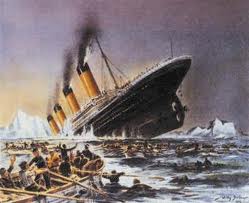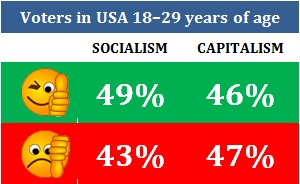 The Titanic of global capitalism has started to sink. The creaks and bangs of the gigantic ship breaking up, the shouts and howls of confused crew and desperate passengers, the incessant feed of nonsensical messages over loudspeakers, will continue to rouse general panic for some more time. In the end nothing can save the enormous structure from the very icy waters of its final demise.
The Titanic of global capitalism has started to sink. The creaks and bangs of the gigantic ship breaking up, the shouts and howls of confused crew and desperate passengers, the incessant feed of nonsensical messages over loudspeakers, will continue to rouse general panic for some more time. In the end nothing can save the enormous structure from the very icy waters of its final demise.
By Prabhakar Overland
A Pew poll[1] taken in April 2012 show that the economy and jobs remain the most important issues of this presidential campaign, more than four in five registered voters thought. Only one in two thought that previous hot issues such as terrorism and abortion remained most crucial.
In fact, the economic crisis in America has reached the point where voters are ready to reject capitalism itself. In December last year, registered young voters in the U.S. said they preferred socialism to capitalism for the first time ever, and were more negative to capitalism than positive:
Pew poll conducted late December 2011
and the rats are leaving, too …
Jan. 25, 2012 (Bloomberg) – International investors say capitalism is in crisis, with almost one in three backing radical changes to the system, according to a Bloomberg survey.
As the global financial and business elite gather in Davos for their annual forum, a majority in the Bloomberg Global Poll agree that income inequality hurts the economy and that governments need to do something to address it – ideas at the heart of “Occupy” protests worldwide. Those surveyed also voice reservations about the financial industry’s role in society, with seven in 10 seeing at least some truth in the argument that banks have too much power over governments.
“Capitalism is in crisis because there is a huge and growing disparity in income/wealth distribution in Western economies, and an equally divisive generational disparity,” poll participant Michael Derks, chief strategist for FXPro Financial Services broker in London, said in an e-mail.
“It requires government intervention on an enormous scale, because an economy cannot survive if it does not invest in the younger generation,” Derks said. [2]
Unprecedented crisis
The present crisis in global exploitative capitalism is tremendous and in many ways unprecedented:
- The crisis is global: Everywhere people are confronted with serious problems caused by capitalism’s single-minded pursuit of profits; capitalism is being universally questioned.
- The crisis is unsustainable: As profit margins come under increasing pressure in the global village, capitalism takes on the appearance of a civil war being fought out between giant corporations on the world’s stock exchanges for reasons far removed from the realities of most people.
- The capitalist race itself is basically unsustainable: The physical world is limited and we all need to take part in a coordinated effort for proper utilization through sharing of resources.
In short,capitalism’s main inner self-contradiction is critically breaking its keel: Capitalism’s insatiable greed for limited physical wealth.
Moreover, modern technology accelerates the crisis:
- Financial and commercial trade operates through a 24/7 network of high-powered sophisticated technology that holds the world a permanent hostage to speculation.
- Hyper-alert robot technology drives the stock markets still further away from economic realities, creating fluctuations faster than humans can think.
And the media amplifies and reinforces the crisis:
- Acting as a pressure cooker outside and inside the manipulative system, commercial media bombard market players with information that rapidly gets translated into dramatic figures.
Here are some real figures:
- January 2012: Two-thirds of the U.S. public believe there are “very strong” or “strong” conflicts between the rich and the poor, The Pew Global Attitudes Project reports.
- May 2011: An OECD report concludes that income inequality is rising in most developed countries. Kentaro Toyama, an information researcher at Berkeley, writes in The Atlantic:
“The report should be disturbing for centrists who believe both in free markets and social equality. If free-market capitalism works so well for every income level, why have so many people seen income pass them by with capitalism working more efficiently than ever before?” [3] - January 2012: Youth unemployment throughout the EU stands at 25%. By September in Spain it is 50%. Half of Britain’s young black males are out of work, reports the UK Office for National Statistics.
- January 2011: 1 in 4 young people (aged 16-24) are unemployed in Middle East and North Africa, a factor that contributed considerably to the rapid mobilization and explosive character of the Arab Spring, the International Labor Organisation reports.
- 2011: 1 in 7 people are hungry [4]. According to the World Health Organization, hunger is the single most serious threat to the world’s public health. Six million children die of hunger every year; half of all child mortality is caused by malnourishment. Undernourishment currently affects about 14% of the world population.
- October 2010: Global environmental damage cost $6.6 trillion during 2008, equivalent to 11 per cent of global GDP, and is set to quadruple by 2050, the UN reports.
Unprecedented response
Management responses to the present crisis are unprecedented, too. The last time the world was shattered by a gigantic economic downturn, in the 1930s, the burst of an enormous bubble of speculation took authorities by surprise. Today they are much better prepared:
- The present organization of global capitalism, spearheaded by the IMF, the G8, etc., will continue to present powerful arguments for passing laws and regulations for sustaining the exploitative system.
- Interventions, such as quantitative easing, debt packages, etc., will continue to be orchestrated between countries.
- In addition to its phenomenal media power, today’s mature capitalism has formidable research, academic and technological resources at their disposal.
This remarkable machinery will be able to somehow stall a fundamental collapse for some time. We will therefore continue to see increasingly dramatic fluctuations until the system goes down for good.
So far only Greece and Spain have seen sustained mass demonstrations in reaction to cuts in public spending, galloping unemployment, etc. Elsewhere, people still seem to think: “It isn’t really happening here, the global system has been allowed to run amok, someone fix it!”
Going down for sure
Where are the life boats then? Well, capitalism itself provides none — it never had proper plans and programs in place for economic and financial rescue. For instance, the pension funds of hundreds of millions of people are now being used for speculation on the stock exchanges. These, too, will be lost forever in that fathomless, unforgiving sea.
Capitalism is not just a few particularly bad apples. It is an all-encompassing, ever-encroaching cancer on human sense and sensibilities. In fact, capitalism was always a reckless system totally averse to taking real social responsibility in a crisis situation. Even in its death throes capitalism’s focus will remain on making profits out of the terrible chaos it has created.
It is up to ordinary people and their governments to find a new way once they are on dry land again. New laws and rules will certainly forbid liberal capitalism and favour a system better able to secure progress for all.
Sources
1 Poll taken by Pew Research Center, April 4-15, 2012
2 Business Week
3 The Atlantic, May 13, 2011
4 Hunger Notes

